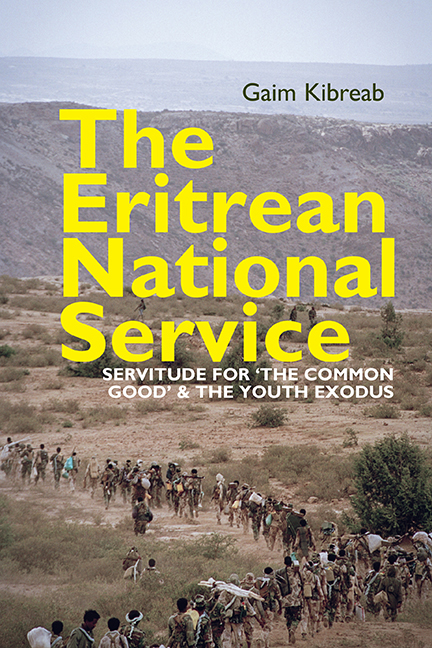Book contents
- Frontmatter
- Dedication
- Contents
- List of Figures and Tables
- Foreword
- Acknowledgements
- List of Acronyms & Abbreviations
- 1 Introduction
- 2 National/Military Service in Africa: Theories and Concepts
- 3 The Government and the Structure of the Eritrean Defence Force
- 4 The Nature of the Eritrean National Service and its Effectiveness as a Fighting Force
- 5 The Eritrean National Service as a Mechanism of Preserving and Transmitting the Core Values of the Liberation Struggle
- 6 The Eritrean National Service: A Vehicle for National Unity and Cohesion
- 7 The Eritrean National Service and Forced Equality
- 8 The Overarching Impact of the Eritrean National Service on the Social Fabric of Eritrean Society
- 9 Impact of the Open-Ended Eritrean National Service on Families and Conscripts
- 10 Conclusion
- Postscript: The UK Upper Tribunal (Immigration and Asylum Chamber) Country Guidance on Eritrea
- References
- Index
- Miscellaneous Endmatter
9 - Impact of the Open-Ended Eritrean National Service on Families and Conscripts
Published online by Cambridge University Press: 11 August 2017
- Frontmatter
- Dedication
- Contents
- List of Figures and Tables
- Foreword
- Acknowledgements
- List of Acronyms & Abbreviations
- 1 Introduction
- 2 National/Military Service in Africa: Theories and Concepts
- 3 The Government and the Structure of the Eritrean Defence Force
- 4 The Nature of the Eritrean National Service and its Effectiveness as a Fighting Force
- 5 The Eritrean National Service as a Mechanism of Preserving and Transmitting the Core Values of the Liberation Struggle
- 6 The Eritrean National Service: A Vehicle for National Unity and Cohesion
- 7 The Eritrean National Service and Forced Equality
- 8 The Overarching Impact of the Eritrean National Service on the Social Fabric of Eritrean Society
- 9 Impact of the Open-Ended Eritrean National Service on Families and Conscripts
- 10 Conclusion
- Postscript: The UK Upper Tribunal (Immigration and Asylum Chamber) Country Guidance on Eritrea
- References
- Index
- Miscellaneous Endmatter
Summary
When I went home on a short leave, I found my parents in a wretched state. Most of their livestock died because there was no one to look after them. Weeds overtook all their farms except the small plot near the village, including the irrigated farm. I found my family reduced to abject poverty. This was the most painful thing I ever witnessed in my life. I crossed the Rubicon (mewedata betsihe) the moment I saw my mother and father on the verge of starvation. I love my country and I recognise that I have a duty to defend it against an external enemy. However, the government's claim notwithstanding, in 2005 there was no evidence whatsoever to indicate that Eritrea's sovereign existence was under threat. In the absence of a real threat to Eritrea's national security, my primary duty became to alleviate the plight of my family by any means.
Tekle (Interview, London, 17 February 2014)This chapter analyses the impact of the Eritrean National Service (ENS) on the livelihoods of families, and conscripts’ careers, survival and wellbeing. Further, the dissenting opinions of a few respondents who see the ENS as the ultimate good and worth sacrificing one's own and one's family's present and future interests are considered briefly. Eritrean society is predominantly agrarian. The large majority of households and individuals derive their livelihoods from subsistence agriculture and other related or unrelated off-farm income-generating activities. Agriculture and allied activities, such as crop production, livestock herding, forestry, and traditional fishing constitute the basis of livelihood for about 80 per cent of the population (World Bank 2015a). Given the rudimentary nature of the technology in use, agricultural production in the country is labour intensive. Due to a shortage of capital, a lack of credit facilities and small farm sizes, the overwhelming majority of subsistence farmers depend on family, rather than hired, labour. Given the arid and semiarid nature of the environment within which nearly 80 per cent of the population eke out their meagre existence, rain-fed farming is a highly risky enterprise and, as a result, food security remains one of the major preoccupations in the country (Kibreab 2009a, 2009c; World Bank 2015a).
- Type
- Chapter
- Information
- The Eritrean National ServiceServitude for 'the common good' and the Youth Exodus, pp. 153 - 176Publisher: Boydell & BrewerPrint publication year: 2017



